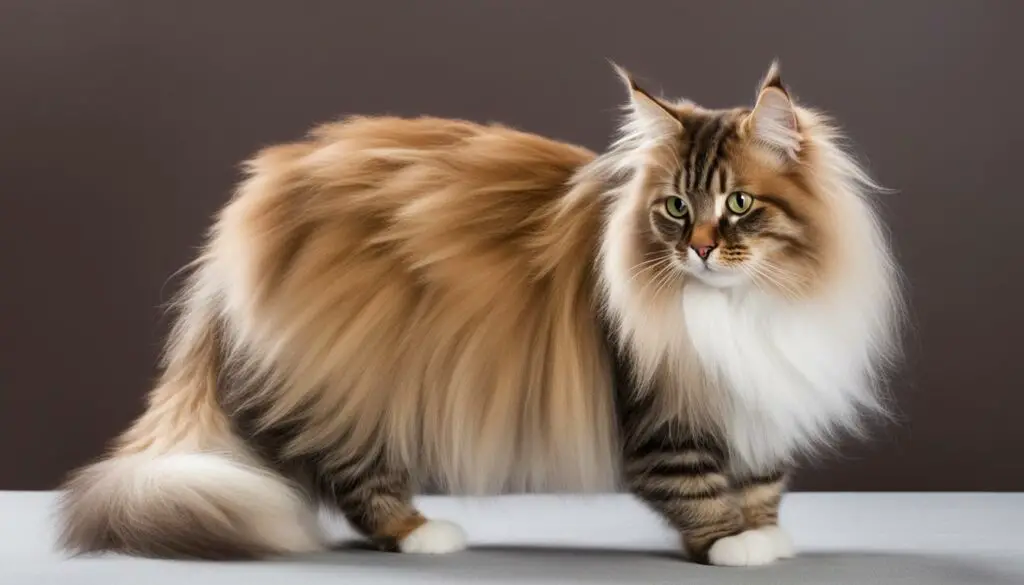Have you ever wondered why cats raise their butts when being stroked? It’s a peculiar behavior known as “elevator butt,” and it can have various meanings. As a cat owner, it’s important to understand the reasons behind this behavior to better care for your feline friend.
Cats exhibit elevator butt behavior for several reasons. It can be a sign of enjoyment, indicating that they are enjoying the attention and want the stroking to continue. Female cats in season may raise their butts as part of their reproductive behavior. Additionally, it can be an instinctual behavior learned from their mother during bonding moments. Cats may also raise their butts when greeting other cats or humans as a form of social interaction.
While elevator butt behavior is usually harmless, it’s essential to be aware of potential health issues. If your cat exhibits unusual movements or acts strangely while raising their butt, it may be a sign of a health problem. Itchiness, fleas, allergies, infections, or even pain in the back or tail can cause this behavior. If you notice any concerning changes in your cat’s behavior, it’s best to consult a veterinarian for further evaluation and advice.
Overall, understanding the curious case of cat elevator butt behavior helps us interpret and appreciate this unique feline quirk. It’s part of the amusing and intriguing world of cats, enhancing our bond with them.
Key Takeaways:
- Cats raise their butts when being stroked for various reasons, including enjoyment and as part of their reproductive behavior.
- Elevator butt behavior can also be an instinctual behavior learned from their mother during bonding moments.
- Cats may raise their butts when greeting other cats or humans as a form of social interaction.
- If a cat exhibits unusual movements or acts strangely while raising their butt, it may be a sign of a health problem.
- Understanding your cat’s elevator butt behavior helps strengthen the bond and care you provide.
Why Do Cats Raise Their Butts When You Stroke Them?
Cats are fascinating creatures with unique behaviors that often leave us wondering what they’re thinking. One peculiar behavior commonly observed is when cats raise their butts when being stroked. But what exactly does this behavior mean? Let’s explore some possible reasons behind this curious feline action.
Enjoyment and Affection: When a cat raises its butt while being stroked, it’s often a sign of enjoyment and affection. By lifting their hindquarters and tail, cats are getting closer to the person giving them attention and showing that they want more. It’s their way of complimenting us and indicating that they’re enjoying the interaction.
Instinctual Behavior: Another reason behind this behavior stems from a cat’s early bonding moments with its mother. When kittens are young, their mother takes care of grooming them. During these grooming sessions, kittens often push their butts towards their mother to ensure she reaches all the right spots. This instinctual behavior can carry over into their interactions with humans, leading them to raise their butts during moments of bonding and affection.
Social Interaction: Cats raise their butts not only when being stroked but also when greeting other cats or humans. This behavior is a form of social interaction in the feline world. By raising their butts or sticking their bums in someone’s face, they are sharing their scent and establishing a connection. While this behavior may not be socially acceptable for humans, it is a normal behavior for cats and should be understood as a form of greeting and communication.
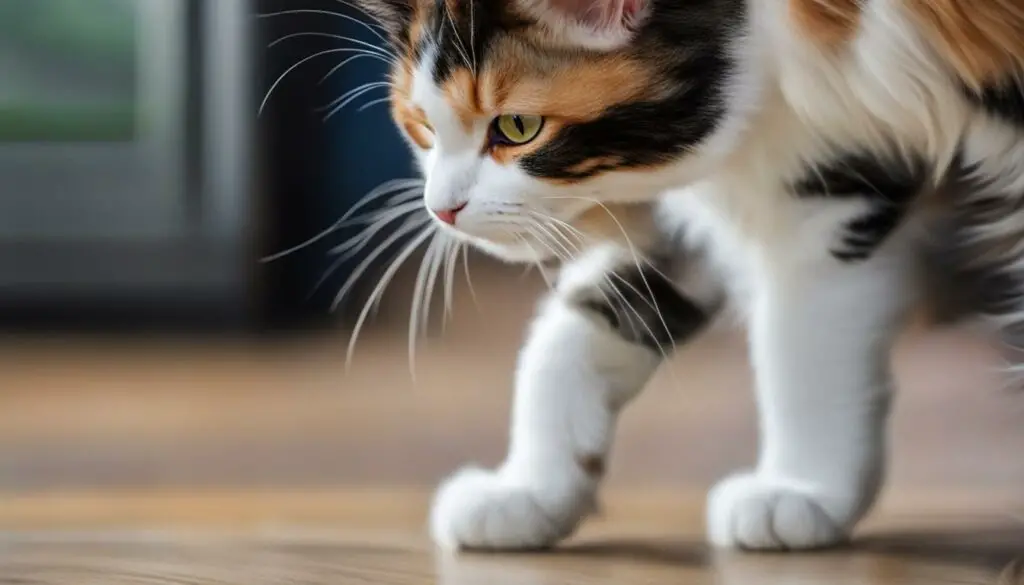
Understanding why cats raise their butts when being stroked can help us better interpret their behavior and strengthen our bond with them. Whether it’s a display of enjoyment, an instinctual behavior from kittenhood, or a form of social interaction, it’s important to recognize and appreciate these unique quirks that make cats such fascinating companions.
Common Reasons for Cat Elevator Butt Behavior
When it comes to cat behavior, elevator butt is undoubtedly one of the most intriguing and amusing quirks that cats display. But what exactly are the common reasons behind this unique feline behavior? Let’s explore some of the main explanations for why cats raise their butts when being stroked or during other interactions.
Greeting and Social Interaction
Cats are known for their social nature, and raising their butts can be a way of greeting and establishing a connection with other cats or humans. By presenting their rear ends, cats are essentially sharing their unique scent, which acts as a form of communication and territorial marking. While this behavior may seem strange to us humans, it is a completely normal way for cats to say hello and establish social bonds.
Enjoyment and Affection
Cats raise their butts when being stroked as a way of showing that they enjoy the attention and want it to continue. It is their way of complimenting the person giving them affection. By lifting their hindquarters and getting closer to the person, cats are expressing their affection and desire for more interaction.
Instinctual Behavior from Kittenhood
Cats learn many of their behaviors from their early interactions with their mother, and elevator butt is no exception. When kittens are young, they often raise their butts towards their mother during grooming sessions. This instinctual behavior carries over into their interactions with humans, where they may raise their butts as a way of bonding and displaying trust.
| Reasons | Description |
|---|---|
| Greeting and Social Interaction | Cats use elevator butt behavior to establish connections and communicate through scent marking. |
| Enjoyment and Affection | Raising their butts when being stroked is a sign of enjoyment and a desire for more affection. |
| Instinctual Behavior from Kittenhood | Cats learn elevator butt behavior during bonding moments with their mother as kittens. |
So the next time your cat raises their butt, don’t be perplexed or worried. It’s just their unique way of communicating, expressing their affection, and enjoying the special bond they share with you. Embrace this fascinating behavior and continue to shower your feline friend with love and attention.
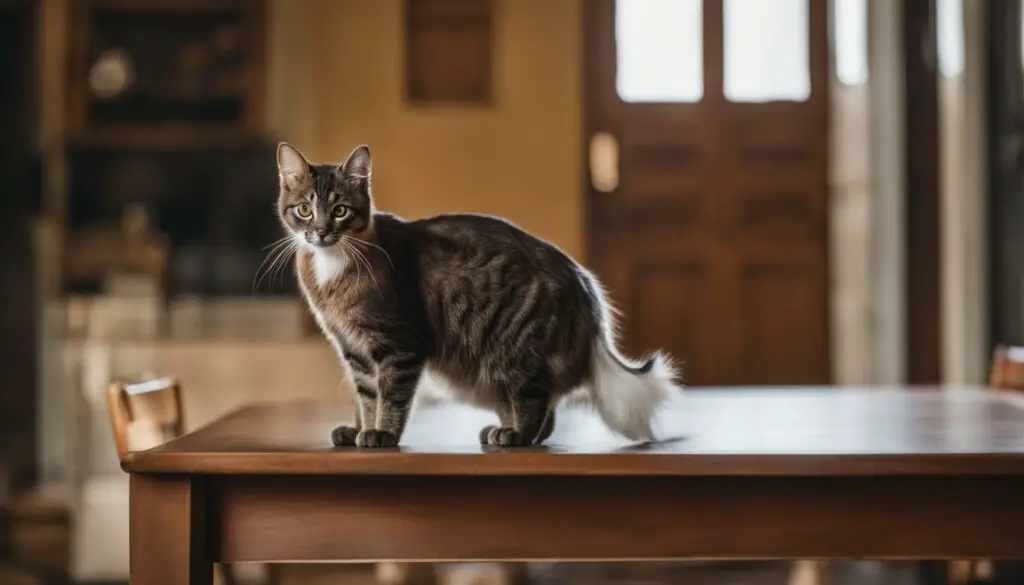
Potential Health Issues Related to Cat Elevator Butt Behavior
While cat elevator butt behavior is usually harmless, it is important to be aware of potential health issues that may be associated with it. If you notice your cat raising their butt and exhibiting unusual movements or acting strangely, it could be a sign of an underlying health problem. Here are some potential health issues that may be related to elevator butt behavior:
1. Itchiness and Fleas
Cats may raise their butts when they are experiencing itchiness, particularly around the back end. This can be caused by flea infestations or other parasites. If your cat is constantly scratching, has coarse fur, bald patches, or red bumps on their skin, they may have fleas. It’s important to address the infestation and consult with a veterinarian for proper treatment.
2. Allergies and Infections
Allergies or infections can also cause itchiness in cats, leading them to exhibit elevator butt behavior. If your cat has sore, red, or inflamed skin, or if they are excessively grooming or overgrooming the affected area, it may indicate an allergic reaction or an infection. A veterinarian can perform a thorough examination and provide appropriate diagnosis and treatment.
3. Back or Tail Pain
In some cases, elevator butt behavior can be a symptom of pain in the back or tail area. Cats may raise their butts as a way to alleviate discomfort or pressure in those areas. If you notice your cat displaying signs of pain, such as reluctance to move, sensitivity when touched, or changes in mobility, it’s important to seek veterinary advice to identify and address the underlying cause.
4. Cat Bite Abscess or Other Injuries
Cats are known to engage in territorial disputes or aggressive behaviors with other cats. Elevator butt behavior combined with signs of pain, swelling, or abscesses in the back or tail area may indicate a cat bite abscess or other injuries. It’s crucial to have your cat examined by a veterinarian to prevent further complications and ensure proper treatment.
| Potential Health Issues | Symptoms |
|---|---|
| Itchiness and Fleas | Constant scratching, coarse fur, bald patches, red bumps on the skin |
| Allergies and Infections | Sore, red, or inflamed skin, excessive grooming or overgrooming |
| Back or Tail Pain | Reluctance to move, sensitivity when touched, changes in mobility |
| Cat Bite Abscess or Other Injuries | Pain, swelling, or abscesses in the back or tail area |
Enjoyment and Affection: A Compliment from Your Cat
When it comes to feline behavior, some things can leave us scratching our heads in confusion. One such behavior is when cats raise their butts when being stroked, affectionately known as “elevator butt.” While it may seem odd to us humans, this behavior is actually a compliment from your cat.
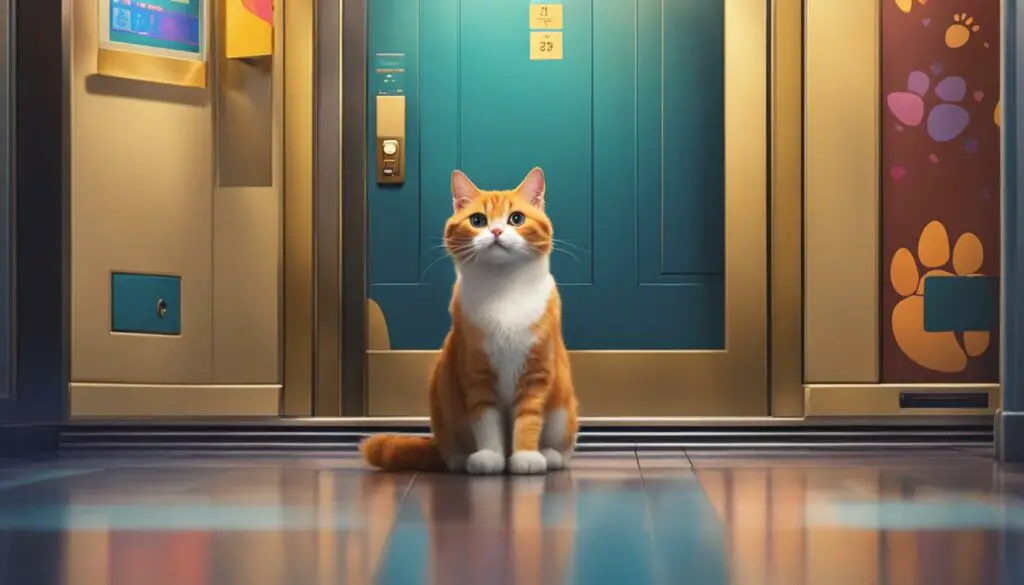
By lifting their bum and tail, cats are getting closer to you, showing that they enjoy your attention and want more. It’s a sign of enjoyment and affection, a way for them to express their contentment and desire for further interaction. So, next time your furry friend raises their butt, take it as a heartwarming compliment.
Understanding this behavior can deepen the bond between you and your cat. It’s a unique way for them to communicate their feelings and show trust. So, embrace the elevator butt and know that your cat is expressing their love and appreciation for you!
In Season: Female Cats and Elevator Butt
Female cats may exhibit elevator butt behavior as part of their reproductive behavior, known as the lordosis position. This behavior involves raising the back end and holding the tail to one side. It is a natural instinct that helps female cats attract male mates during their heat cycle. By assuming this position, female cats signal their fertility and readiness to potential mates.
This behavior is often accompanied by other signs of being in heat, such as increased vocalization, restless behavior, rolling on the floor, and presenting their hindquarters. Female cats in heat will actively seek out attention from male cats and may display affectionate or flirtatious behavior. It is important for cat owners to understand that this behavior is normal and a natural part of their cat’s reproductive cycle.
During this time, it is crucial to take appropriate measures to prevent unwanted pregnancy if you do not intend to breed your cat. Spaying or neutering your cat is the most effective way to prevent unplanned litters and can also have health benefits for your cat. It is recommended to consult with a veterinarian to discuss the best options for your cat’s specific needs.
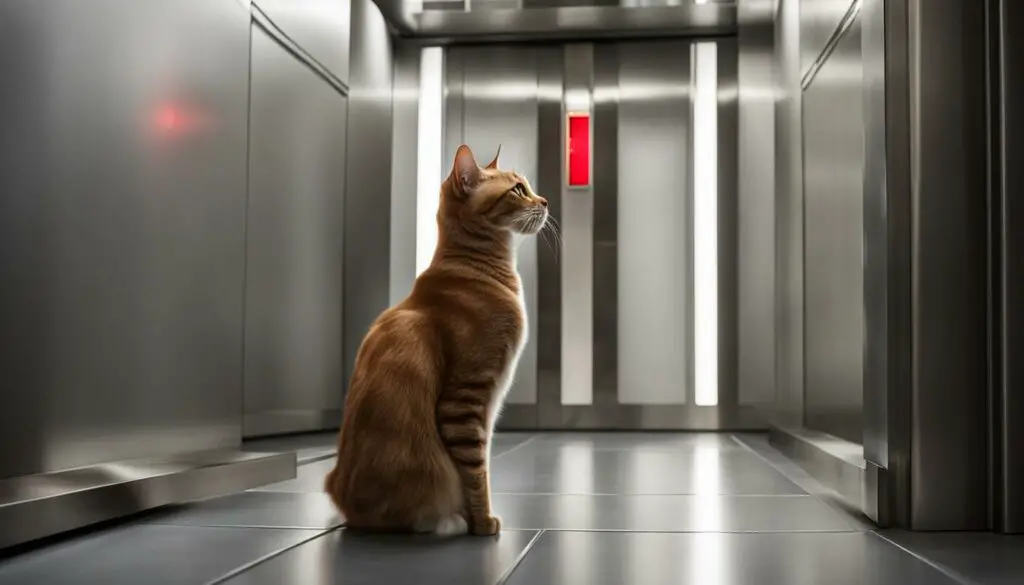
Instinctual Behavior: Bonding Moments with Kittens
Cats raising their butts during moments of bonding can be traced back to their early kittenhood. When kittens are young, their mother takes care of all their grooming needs. During this process, kittens often push their butts towards their mother to help her clean them and ensure that she reaches all the right spots. This instinctual behavior carries over into their interactions with humans, where they may raise their butts during moments of bonding and affection.
This behavior serves as a way for cats to establish trust and connection with their caregivers, just as they did with their mother. It is a natural instinct that helps kittens feel safe and secure, and it continues to be a comforting gesture for adult cats as well. By raising their butts, cats are expressing their vulnerability and allowing their human companions to take care of them, just like their mother did when they were young.
It’s important for cat owners to recognize and appreciate this instinctual behavior as a sign of trust and affection. When a cat raises their butt during a bonding moment, it’s a clear indication that they feel comfortable and safe in their relationship with their owner. This behavior helps strengthen the bond between cats and their humans and allows for deepening levels of trust and love.
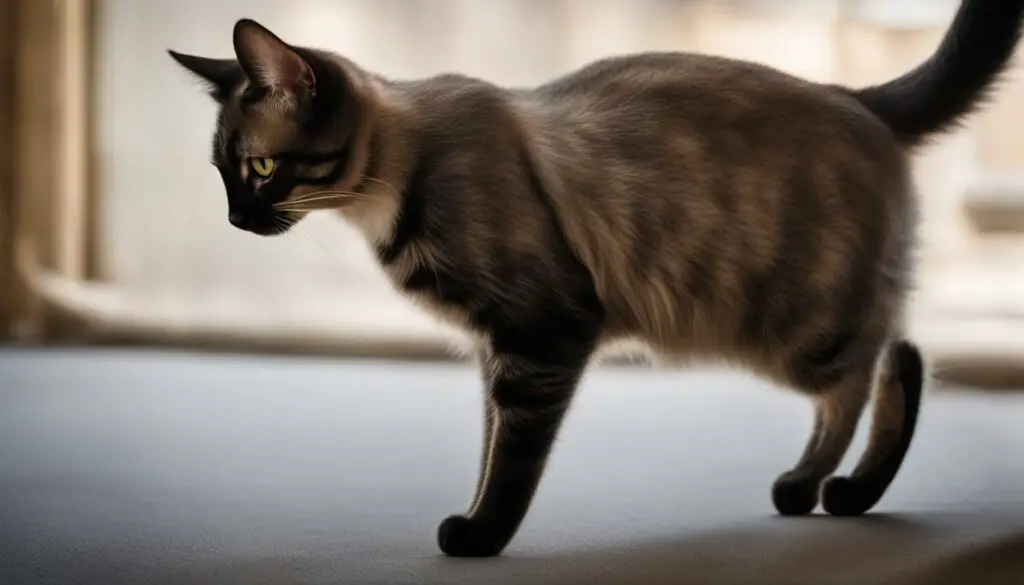
Social Interaction: Greeting with Elevator Butt
Cats have their unique ways of greeting, and one of them is raising their butts. This behavior may seem strange to us humans, but in the feline world, it’s a form of social interaction and communication. By lifting their hindquarters and sticking their bums in someone’s face, cats are sharing their scent and establishing a connection. It’s their way of saying, “Hello, I’m here.”
This behavior is rooted in cats’ natural instinct for scent marking. They have scent glands around their tail base, and by making contact, they transfer their unique scent to objects and individuals, effectively marking them as part of their territory. It’s their way of leaving their mark and communicating with other cats and even their human companions.
While it may not be socially acceptable behavior for us, it’s important to understand that this is a normal part of a cat’s communication repertoire. So, if a cat greets you with their elevator butt, take it as a compliment and a sign that they consider you a part of their social circle.
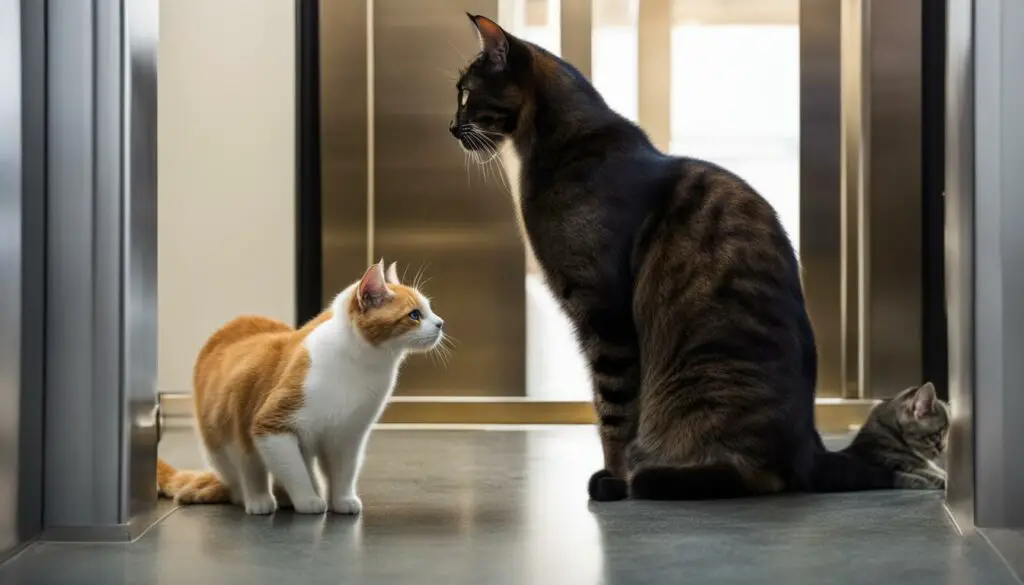
Table: Common Cat Behaviors and Meanings
| Behavior | Meaning |
|---|---|
| High-pitched meow | Request for attention or food |
| Tail twitching | Excitement or agitation |
| Purring | Contentment or seeking comfort |
| Head bumping | Affection or marking with scent |
| Elevator butt | Social interaction and scent marking |
Understanding cat behavior is key to strengthening the bond between cats and their human companions. By recognizing and appreciating their unique ways of communication, we can better understand our feline friends and provide them with the care and attention they need.
Itchiness and Fleas: Causes of Elevator Butt Behavior
Itchiness around the back end can lead cats to exhibit elevator butt behavior. Cats may raise their butts and try to scratch the affected areas in an attempt to alleviate the discomfort caused by itchiness. One common cause of itchiness in cats is fleas. These tiny parasites can make cats extremely itchy, leading them to exhibit unusual behaviors such as elevator butt.
If your cat is displaying signs of itchiness, such as excessive scratching, biting at the fur, or rubbing against surfaces, it’s important to check for fleas. Look for signs of fleas, such as coarse fur, bald patches, red bumps, or scabs on the skin. Flea dirt, which looks like black pepper, may also be present on the cat’s fur.
To address a flea infestation, it’s recommended to consult with a veterinarian. They can provide appropriate flea treatment options, such as topical medications, oral medications, or flea baths. Additionally, treating the cat’s environment, including bedding and carpets, is crucial to prevent reinfestation.
| Possible Signs of Fleas | Actions to Take |
|---|---|
| Coarse fur | Check for fleas and flea dirt |
| Bald patches | Consult with a veterinarian for flea treatment options |
| Red bumps or scabs on the skin | Treat the cat’s environment to prevent reinfestation |
“Itchiness, particularly around the back end, can cause cats to exhibit elevator butt behavior. Cat owners should be aware of the signs of fleas, such as coarse fur, bald patches, red bumps, or scabs on the skin, and take appropriate measures to address the infestation.”
Potential Itchiness Triggers: Allergies and Infections
When it comes to elevator butt behavior in cats, itchiness can be one of the underlying triggers. Allergies and infections are common culprits that can cause cats to exhibit this behavior. Itchy skin can be a symptom of various underlying issues, and cats may raise their butts in an attempt to relieve the discomfort.
Allergies can be caused by a variety of factors, including certain foods, environmental allergens such as pollen or dust mites, or even flea bites. When cats are allergic, their immune system reacts to these triggers, leading to itchiness and other symptoms. Infections, on the other hand, can be caused by bacteria, fungi, or parasites, and can also result in skin irritation and itchiness.
It is important for cat owners to observe their cats for signs of allergies or infections, such as sore, red, or inflamed skin, as well as excessive grooming or overgrooming of the affected area. If any concerning symptoms are noticed, it is advisable to consult a veterinarian for a proper diagnosis and treatment. A veterinarian can help identify the specific allergen or infection causing the itchiness and provide appropriate treatment options.
| Allergies | Infections |
|---|---|
|
|
Understanding the potential itchiness triggers of allergies and infections can help cat owners address their cat’s discomfort and provide the necessary care. By seeking veterinary advice and following recommended treatment options, cat owners can help alleviate their cats’ itchiness and ensure their overall well-being.
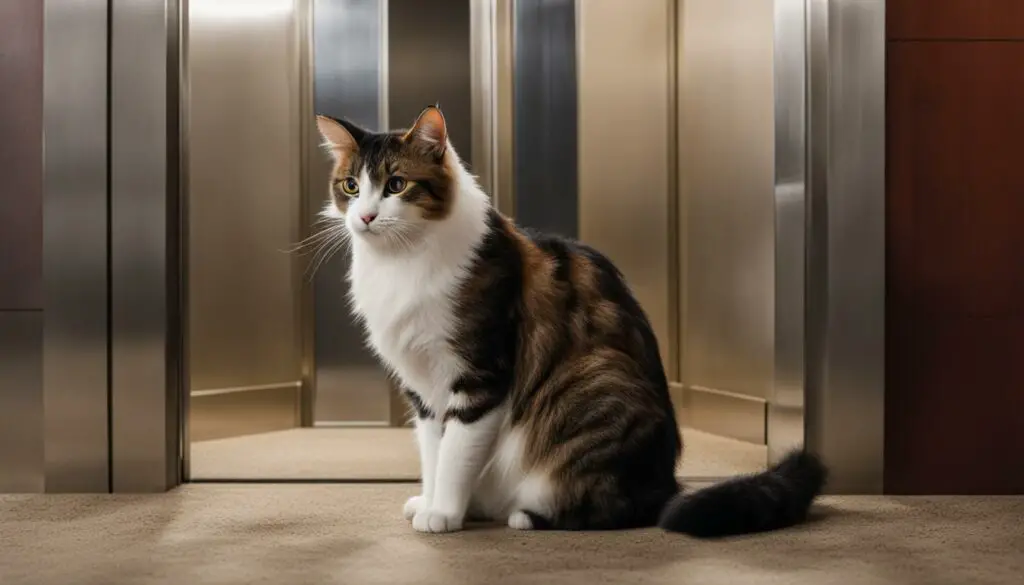
Scent Marking: Communicating Through Elevator Butt
When it comes to understanding our feline friends, one quirky behavior that often leaves cat owners puzzled is the phenomenon known as “elevator butt.” This peculiar behavior occurs when cats raise their hindquarters, often accompanied by a raised tail, when they are being stroked or greeted. While it may seem odd to us, this action serves a vital purpose in a cat’s communication repertoire: scent marking.
Scent marking is a natural behavior in cats, allowing them to leave their unique scent on objects and individuals as a way of communication and reassurance. By raising their butt and making contact, cats transfer their scent from the scent glands located around their tail base. This act marks the person or object as part of their territory, creating a sense of familiarity and security.
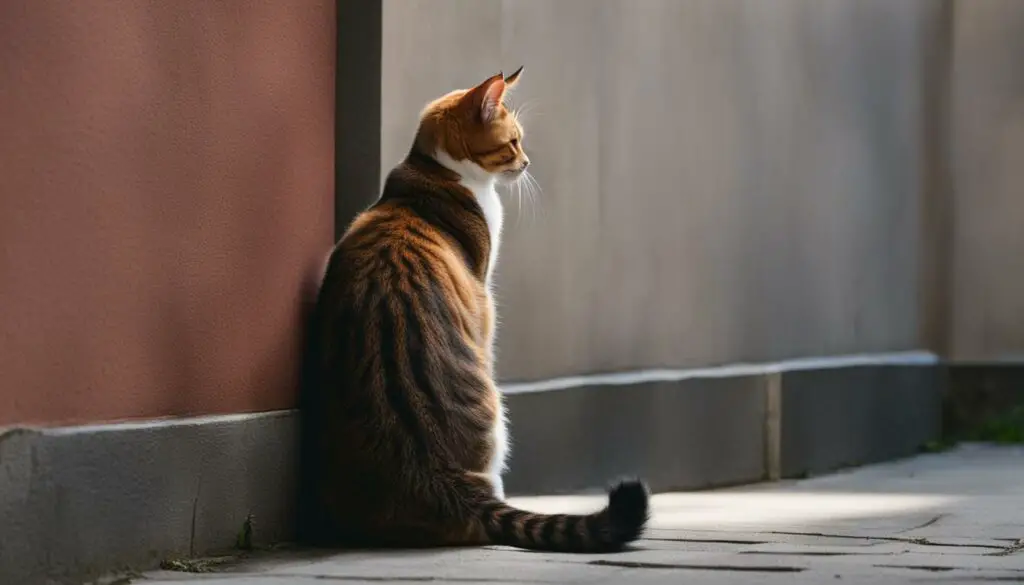
Understanding the purpose of scent marking can help cat owners appreciate the intriguing nature of elevator butt behavior. It is a way for cats to express their social bonds, establish their territory, and create a sense of belonging. So, the next time your feline friend raises their hindquarters in your direction, remember that it is their unique way of communicating with you and marking you as a cherished part of their world.
When to Seek Veterinary Advice for Elevator Butt Behavior
If your cat exhibits elevator butt behavior, it is generally considered normal and should not be a cause for concern. However, there are certain instances when it may be advisable to seek veterinary advice. If your cat suddenly starts raising its butt more frequently or if there are accompanying changes in movement or behavior, it could be an indication of an underlying health issue.
Some potential health issues that may be associated with elevator butt behavior include itchiness, pain, or sensitivity. It is important to observe your cat closely and look for any signs of discomfort, such as excessive scratching or grooming, redness, inflammation, or sores around the back end. If you notice any concerning symptoms, it is best to consult with a veterinarian for a proper diagnosis and appropriate treatment.
Keep in mind that cats are masters at hiding their pain or discomfort, so it’s crucial to pay attention to any changes in their behavior. Your veterinarian will be able to perform a thorough examination and determine the underlying cause of the elevator butt behavior. They may recommend additional tests or treatments to address any health issues that may be contributing to this behavior.
By seeking veterinary advice when necessary, you can ensure the health and well-being of your feline companion. Regular check-ups and open communication with your veterinarian are essential for maintaining your cat’s overall health and addressing any potential concerns. Remember, it’s always better to be safe than sorry when it comes to your cat’s health.
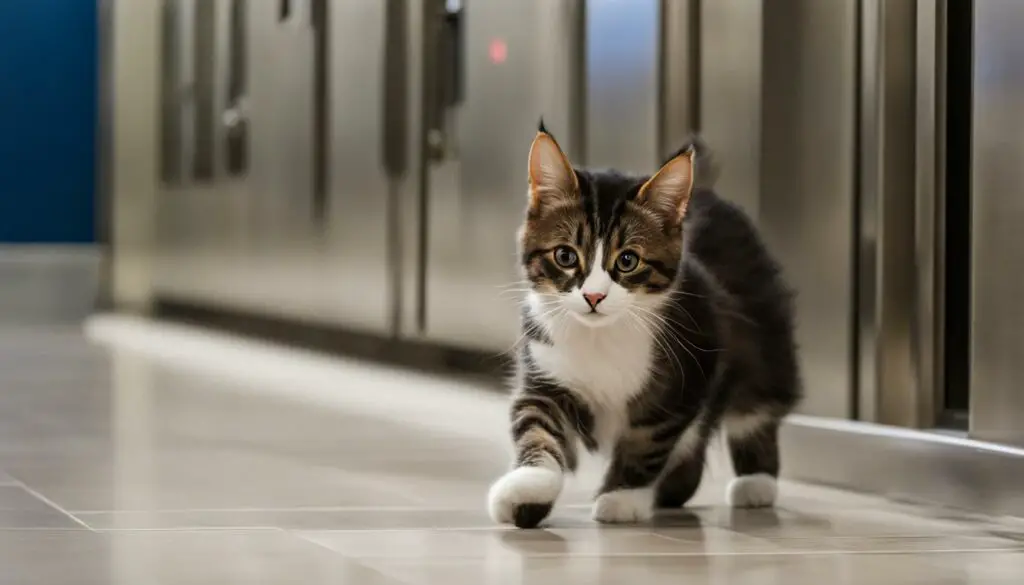
When to Seek Veterinary Advice for Elevator Butt Behavior
| Signs to Watch For | Potential Health Issues |
|---|---|
| Increased frequency of elevator butt behavior | Itchiness |
| Changes in movement or behavior | Pain or sensitivity |
| Excessive scratching or grooming | Redness, inflammation, or sores |
Conclusion
Understanding cat behavior, including the curious case of cat elevator butt, is essential for cat owners to build a stronger bond with their feline companions. Cats raise their butts for various reasons, such as enjoying attention, scent marking, greeting, or indicating potential health issues. By observing their behavior and recognizing these different meanings, we can better interpret their needs and provide appropriate care.
When a cat raises its butt during stroking, it is often a sign of enjoyment and affection. This behavior is a compliment and shows that the cat wants more interaction. Additionally, cats use elevator butt as a form of social interaction, both with other cats and with humans, to establish connections and share their unique scent.
While most cases of elevator butt behavior are harmless, it’s important to be aware of potential health issues. Unusual movements, changes in behavior, or signs of discomfort may indicate underlying problems. If any concerning symptoms are noticed, it is advisable to consult a veterinarian for proper diagnosis and treatment.
Overall, understanding and appreciating cat elevator butt behavior adds to the intriguing world of cats. By being attentive to our feline friends and seeking veterinary advice when needed, we can ensure their well-being and strengthen the bond we share with them.
FAQ
Why do cats raise their butts when you stroke them?
Cats raise their butts when being stroked as a sign of enjoyment and a desire for more attention.
What are the common reasons for cat elevator butt behavior?
Cats raise their butts when being stroked to indicate enjoyment, during female cats’ reproductive behavior, as an instinct from kittenhood bonding, and as a form of greeting and social interaction.
Could cat elevator butt behavior be a sign of a health issue?
Yes, in some cases elevator butt behavior can indicate itchiness, fleas, allergies, infections, pain, or other health issues. It is important to monitor for any concerning changes in behavior and seek veterinary advice if needed.
Is elevator butt behavior a form of affection from cats?
Yes, when cats raise their butts when being stroked, it is often a sign of enjoyment and affection.
What does it mean when female cats raise their butts?
Female cats may raise their butts as part of their reproductive behavior to attract male mates.
Where does the instinctual behavior of raising the butt come from?
Kittens learn to raise their butts during bonding moments with their mother when she grooms them. This behavior can carry over into their interactions with humans.
Why do cats raise their butts when greeting other cats or humans?
Cats raise their butts when greeting as a form of social interaction and scent marking to establish a connection and communicate.
Can itchiness and fleas cause cats to exhibit elevator butt behavior?
Yes, itchiness, particularly around the back end, can cause cats to raise their butts and try to scratch the affected areas.
Can allergies and infections be a trigger for elevator butt behavior?
Yes, itchy skin due to allergies or infections can cause cats to raise their butts in an attempt to relieve the discomfort.
What is the purpose of scent marking through elevator butt behavior?
Cats have scent glands around their tail base, and raising their butts allows them to transfer their unique scent to objects and individuals, marking them as part of their territory and communicating with others.
When should I seek veterinary advice for elevator butt behavior?
If your cat starts exhibiting elevator butt behavior more frequently or if there are accompanying changes in movement or behavior, it is advisable to seek veterinary advice as it could be a sign of underlying health issues.
Source Links
- https://cats.com/why-do-cats-raise-their-butts-when-you-pet-them
- https://www.thesprucepets.com/weird-cat-behaviors-explained-553972
- https://www.humanesociety.org/resources/understanding-feline-language

